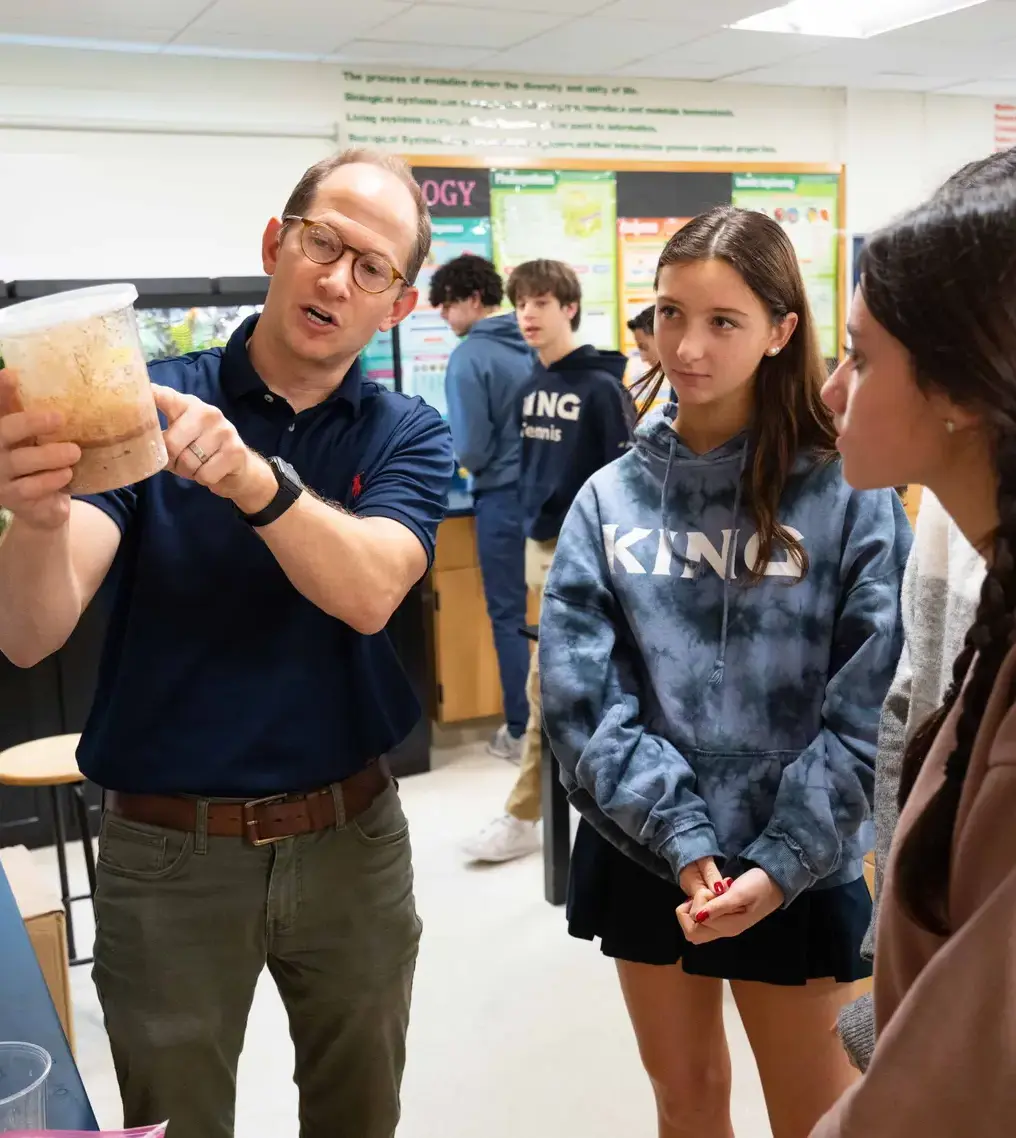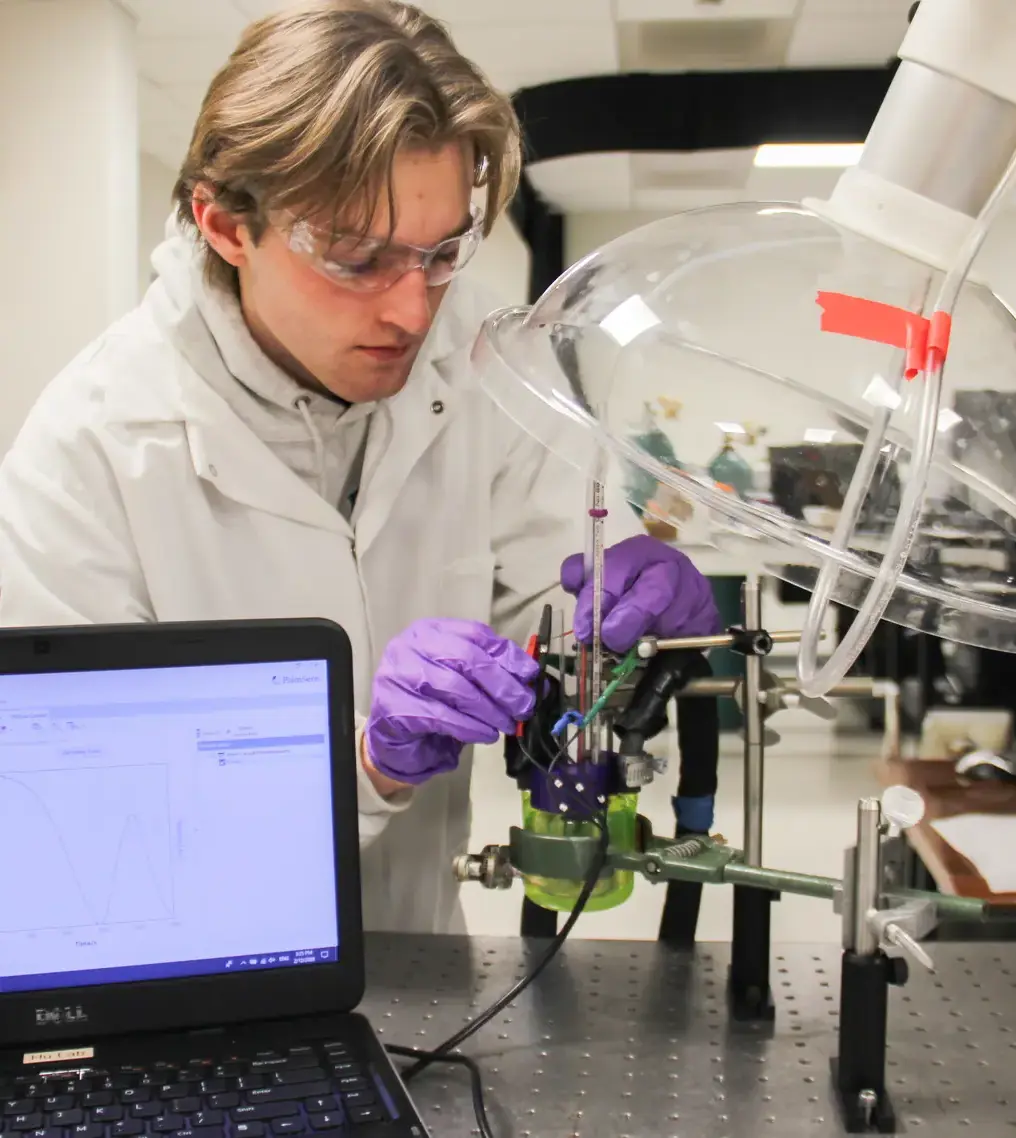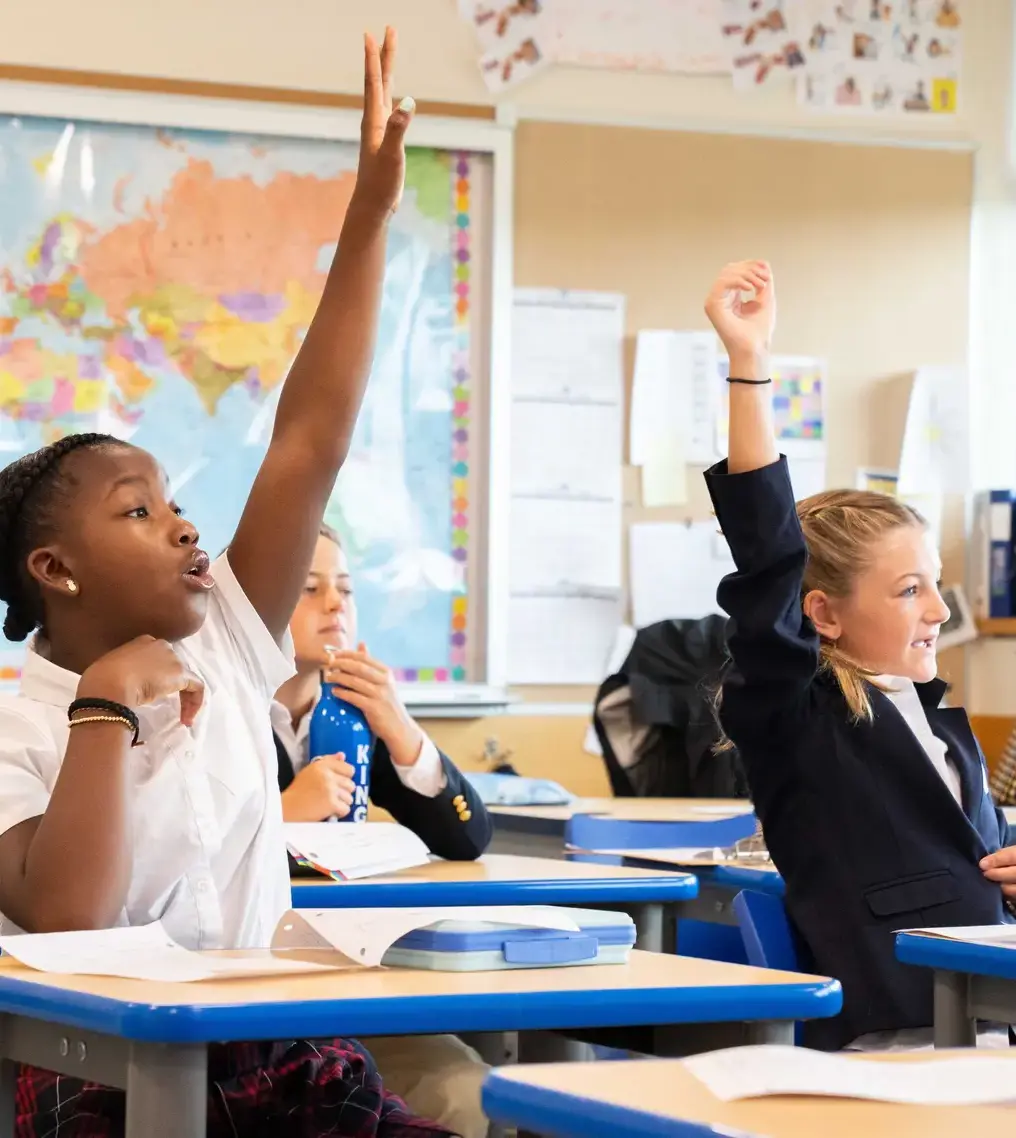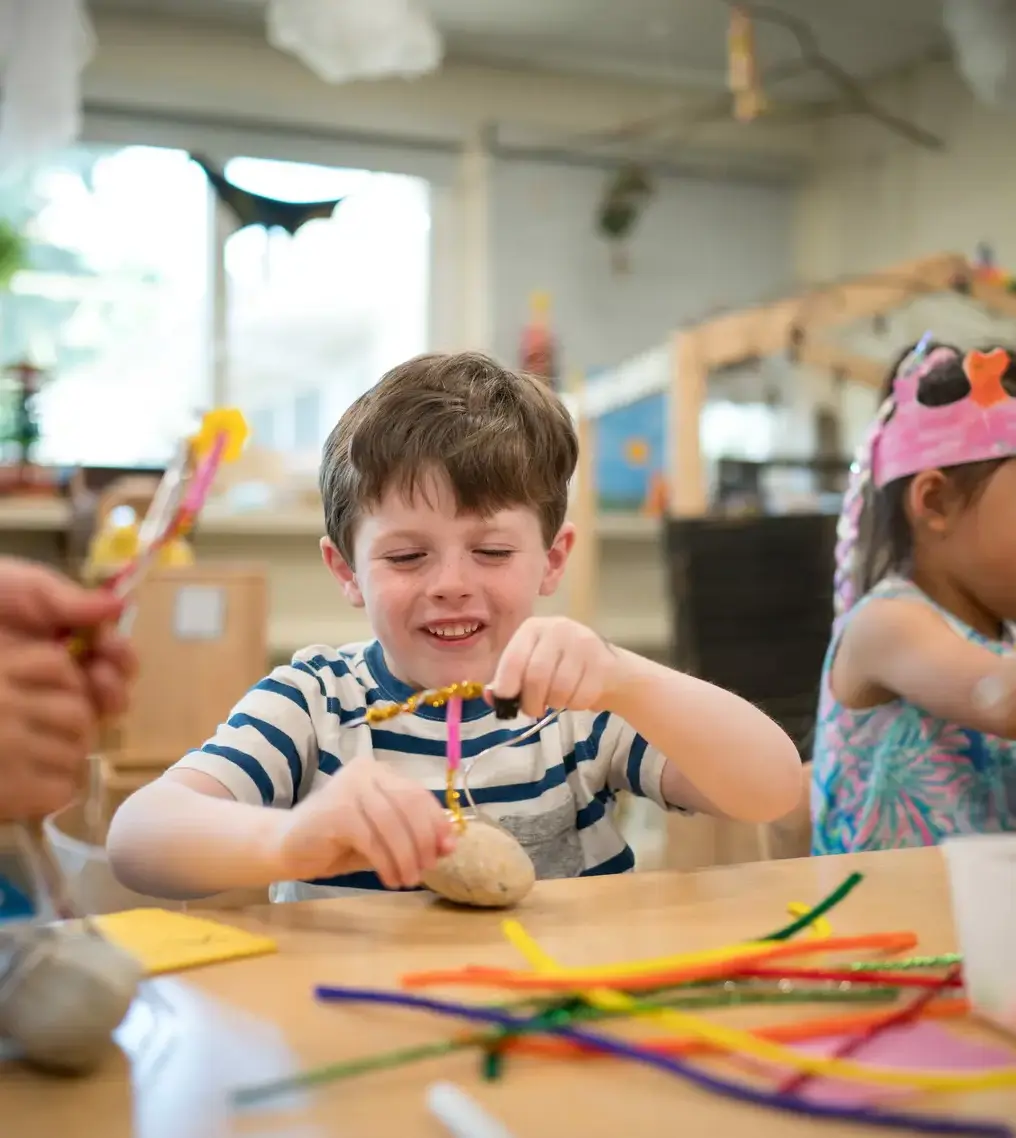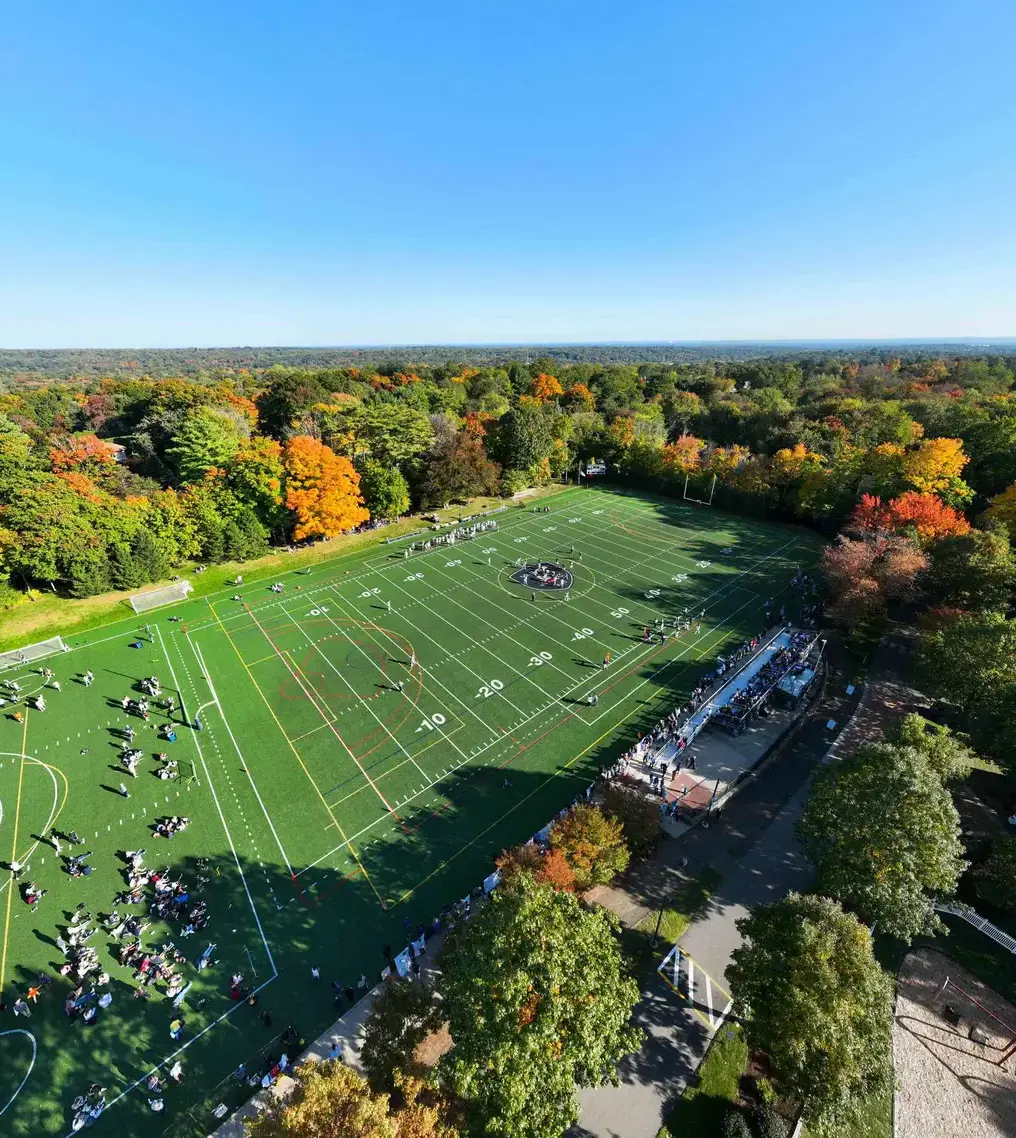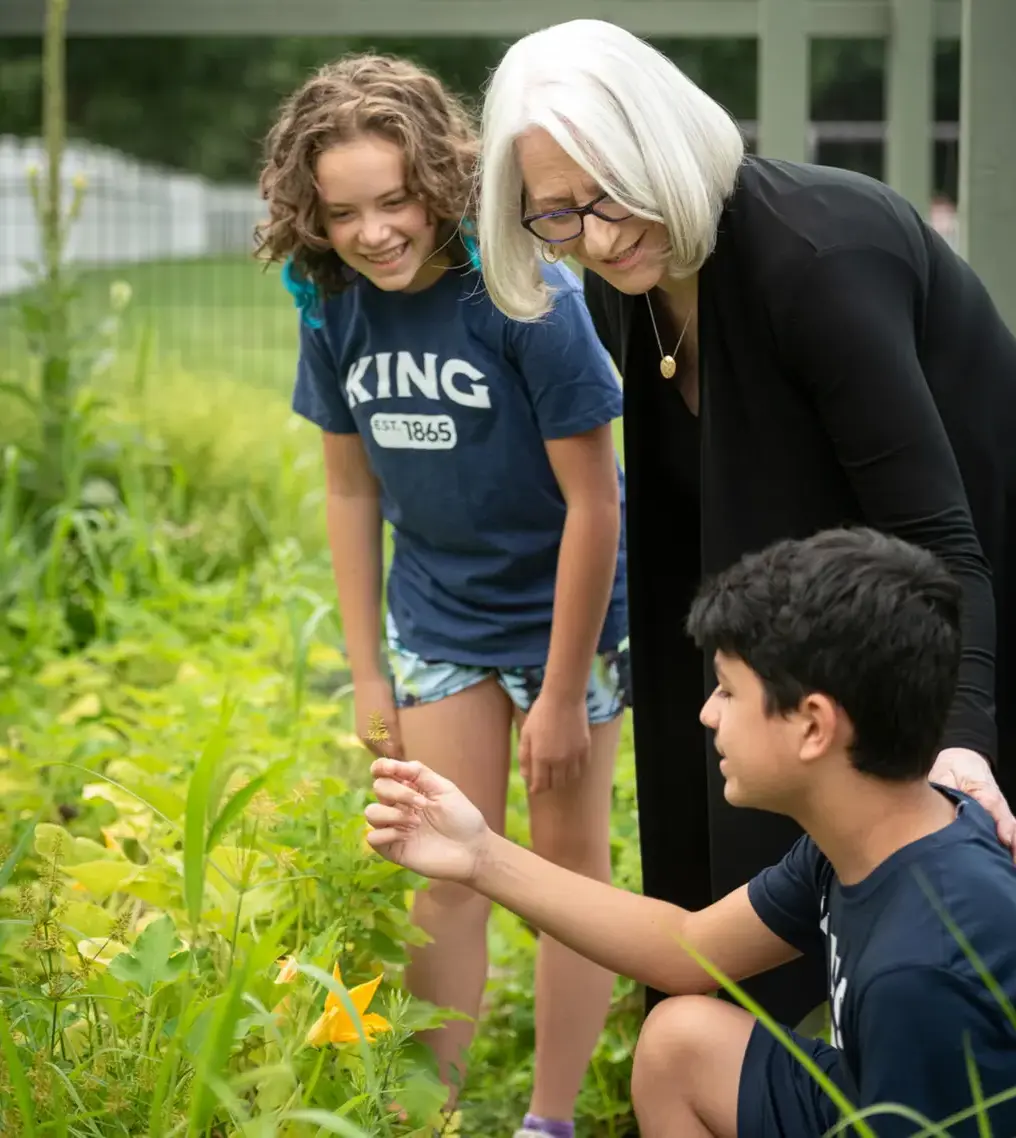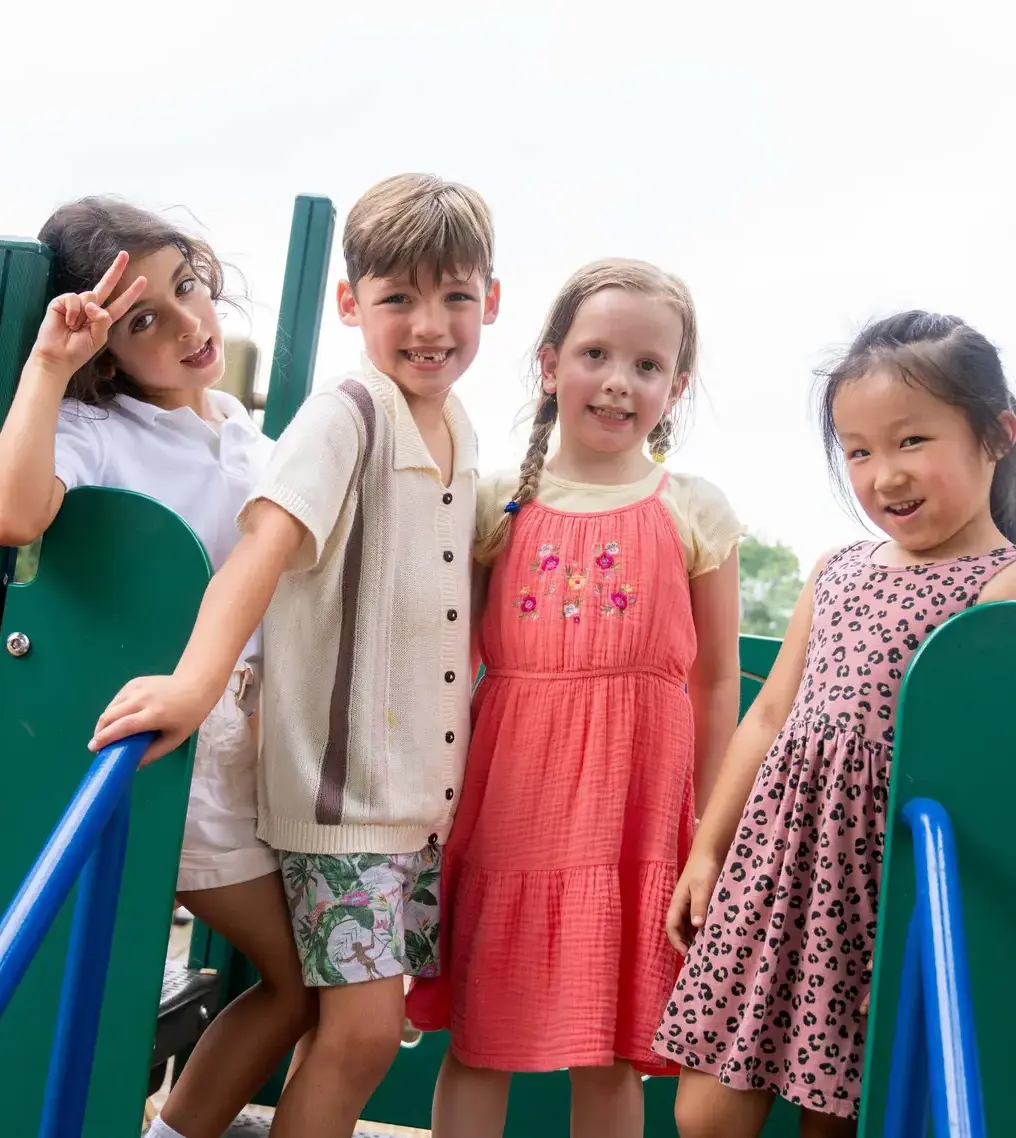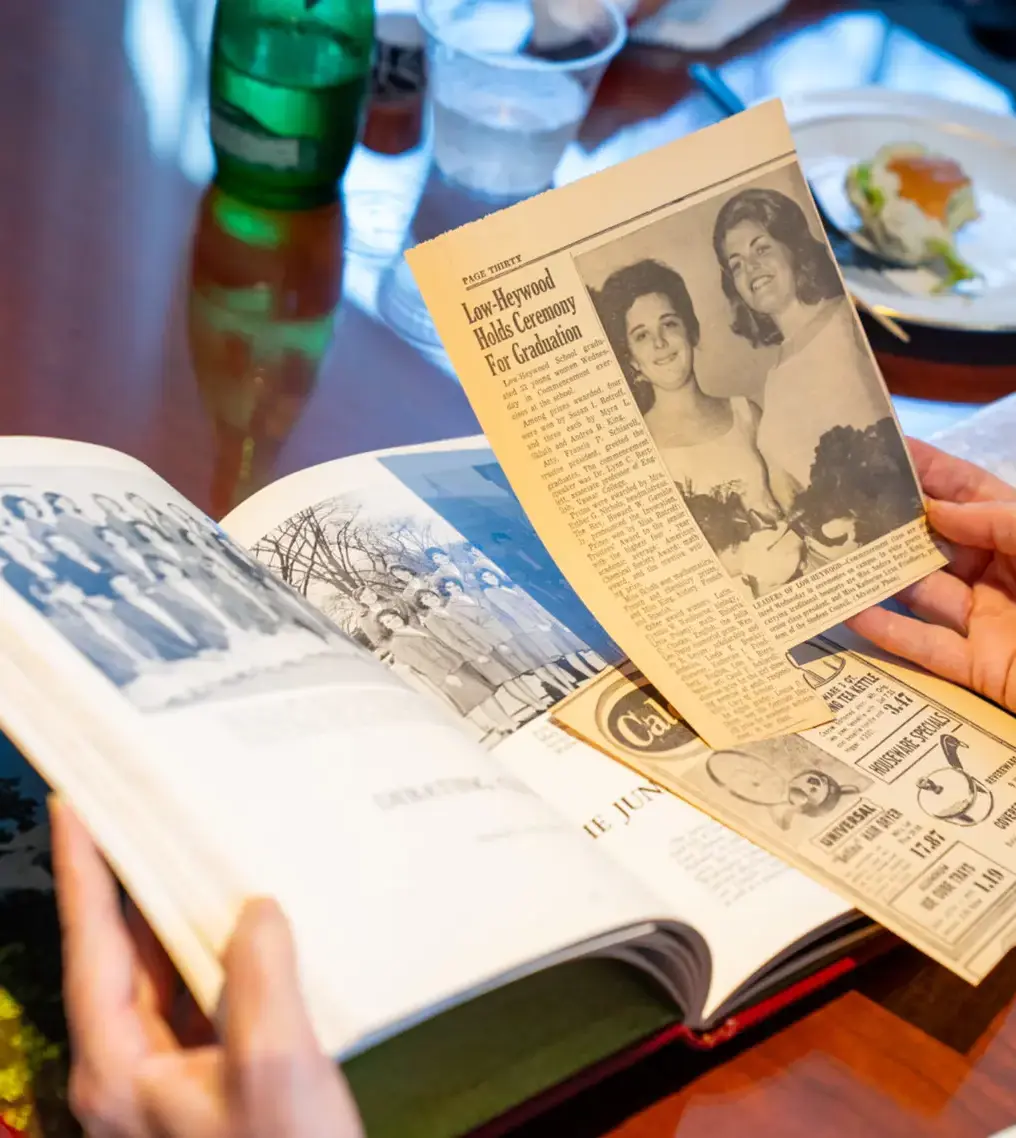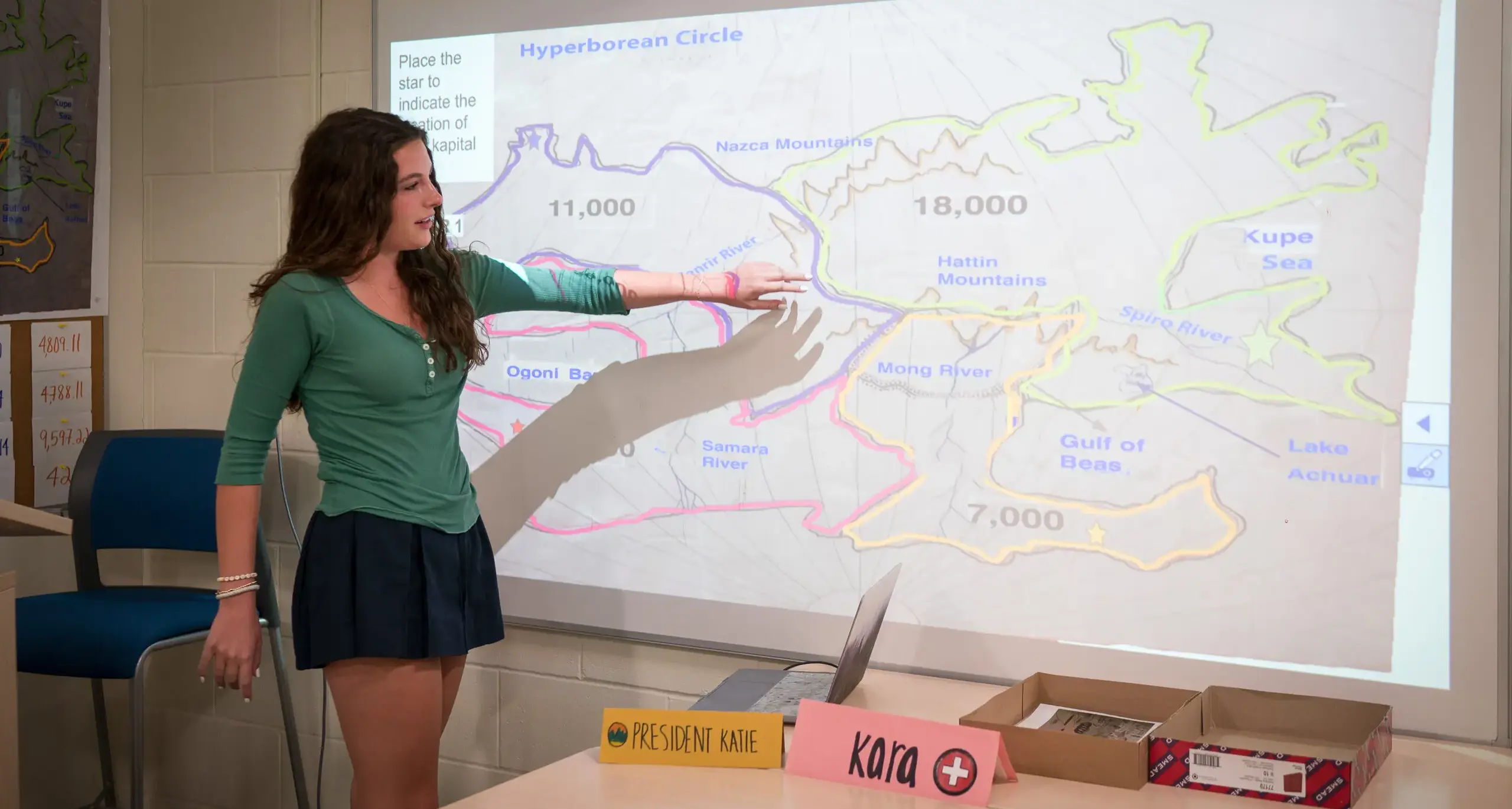Upper School CURRICULUM
Students are able to choose courses based on their interests, so no two students have the same schedule.
Movement between and among our programs is quite fluid and is dependent upon the relative areas of strength for each student. Particularly in highly content-sequential departments like Mathematics and World Languages, departments sometimes will recommend summer work to bridge content gaps if a student is moving, for example, from a College Preparatory program to an Honors program.
| The College Preparatory Program |
|---|
| The College Preparatory Program is the fundamental program in every given discipline. |
| The Honors Program |
| The Honors Program takes College Preparatory courses to a more sophisticated, advanced level, generally preparing students for Advanced Placement courses in their junior and senior years. The pacing of these courses is faster and the content exploration deeper, allowing for the study of more topics and/or texts. |
| The Advanced Placement Program |
|
The Advanced Placement program incorporates and often goes beyond a standardized, national College Board curriculum in preparation for a comprehensive examination in early May. Superior skills in the fundamentals of the various subject areas are generally a prerequisite for entering AP courses, along with a high level of intellectual curiosity and motivation, solid analytical and reasoning ability, and a strong independent work ethic. Departmental approval is required. |
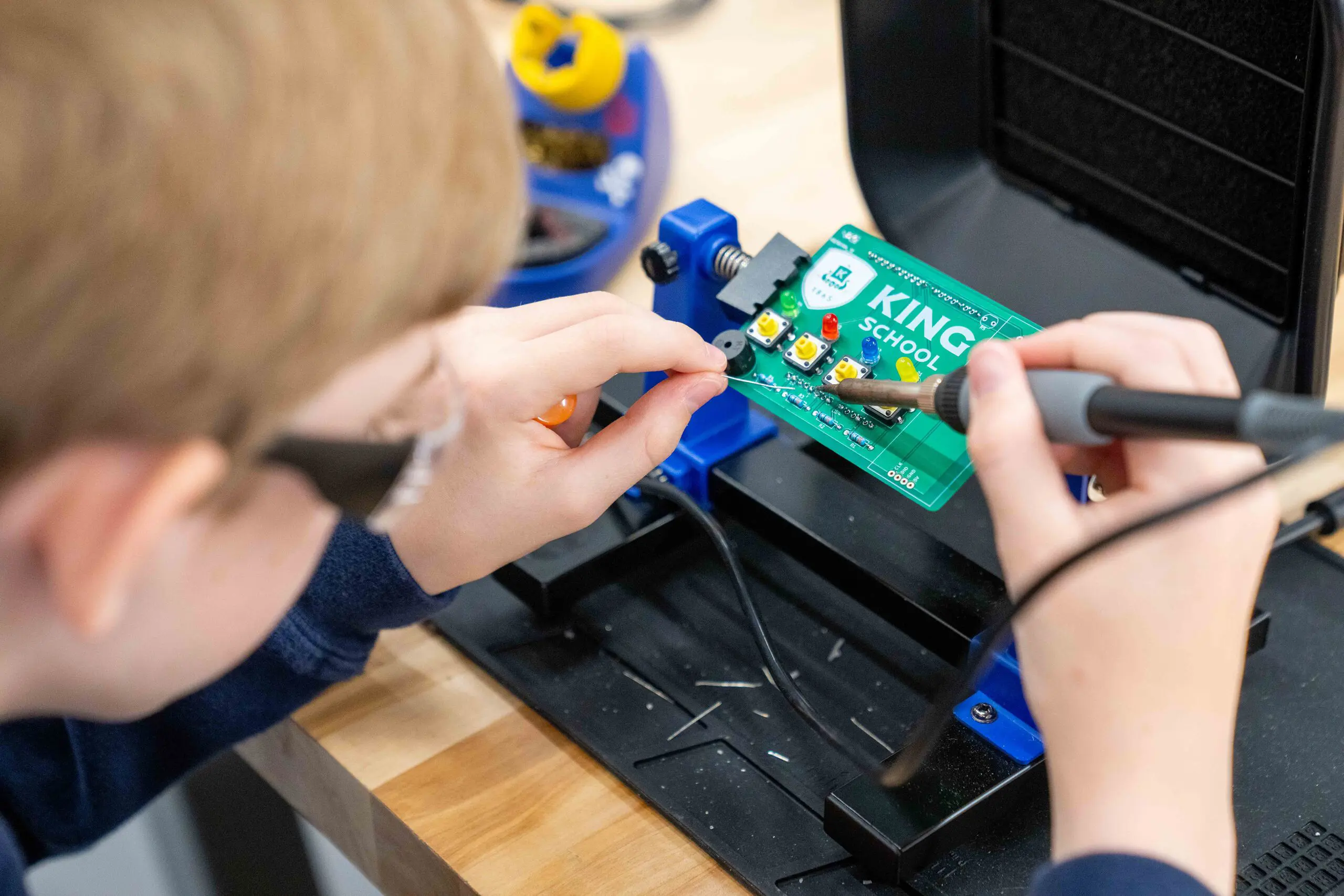
Students can graduate with Certificates of Distinction
The Upper School offers Certificates of Distinction to students who elect to complete additional requirements in particular areas of study beyond the broader graduation requirements.
In an analogy to undergraduate study, the minimum graduation requirements comprise a sort of “major” in the Liberal Arts and Sciences, but the requirements for each Certificate of Distinction comprise an additional, focused “minor.”
Certificates of Distinction are entirely elective. They are only appropriate for students who, by Grade 10, prefer digging deeply into a focused area of study rather than continuing to explore broadly across the curriculum.
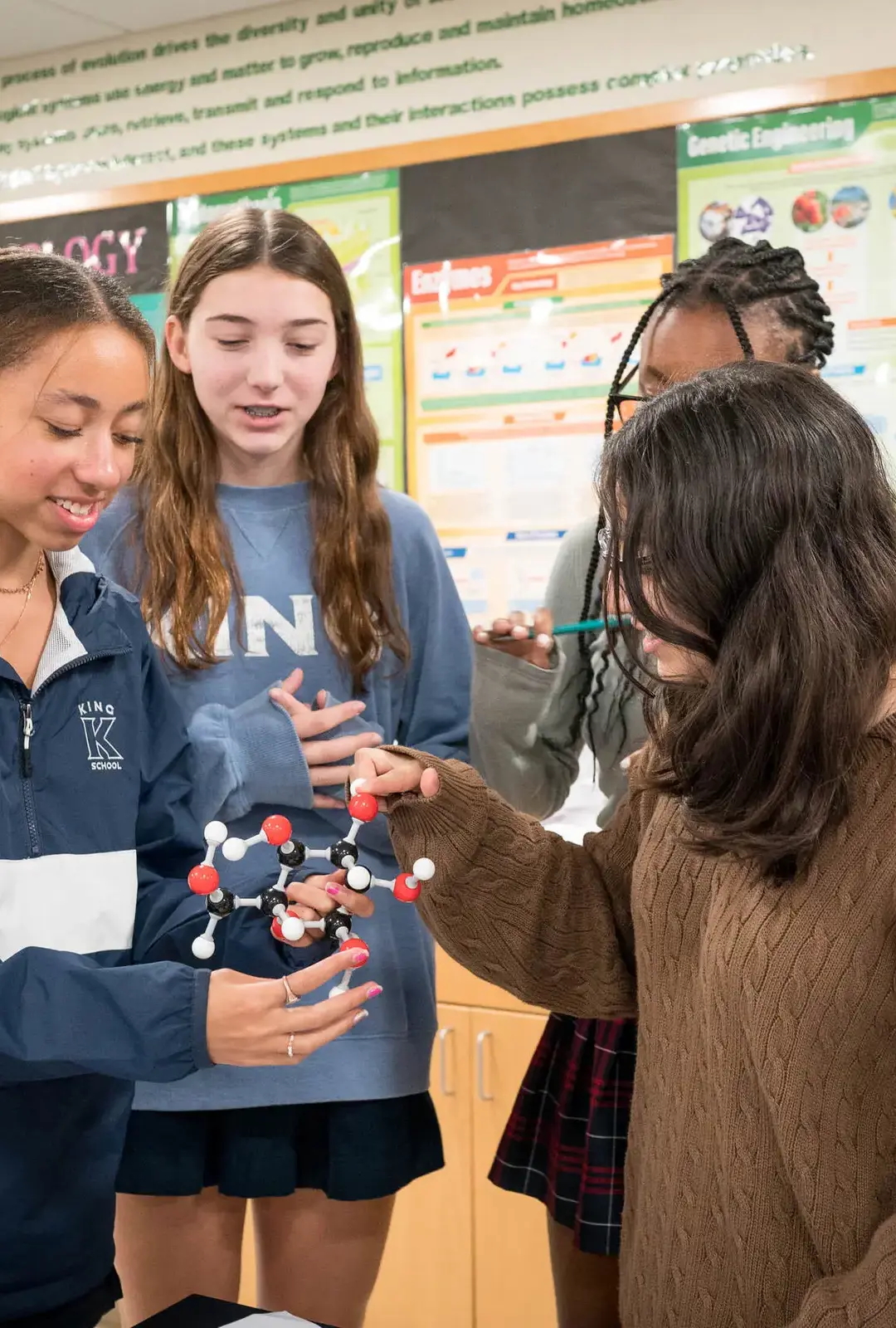 |
Certificates of Distinction
|
Upper School Program Offerings
Read more about our academic philosophy and view detailed descriptions of all courses.
Download the Upper School Curriculum Guide
*College Preparatory and Honors Levels offered
| English |
|---|
|
The English Department offers a wide-ranging, culturally diverse selection of literature that encourages students to explore the challenges and joys of the human condition. In order to prepare students to navigate this increasingly complex world, we engage in conversations that address topics including race, ethnicity, gender, and sexuality. With guidance and encouragement, students develop cultural awareness that is critical to their understanding of themselves and the wider world; we want our graduates to empathize with others’ truths. To this end, students work collaboratively to create meaning from the texts they encounter, whether analyzing and writing about language, framing the narrative in a historical moment, pursuing research opportunities, or engaging with project-based learning. At each grade level, students consistently develop and refine their skills of reading, writing, thinking, speaking, and listening as they encounter increasingly complex texts. Ultimately, they learn to become clear, confident, dynamic communicators in a supportive classroom environment. In particular, the English faculty is committed to helping students develop an authentic, personal voice, foster a love of the written word, and find joy in the act of reading.
|
| Math |
|
The Mathematics faculty works to enhance and expand student understanding of pattern, order, relation, and structure, and the development of abilities of logical analysis, deduction, conjecture and proof, and calculation within the context of these patterns and structures. Students learn that the process used in obtaining a solution is at least as important as a correct answer. The faculty also works to ensure that each student is thoroughly familiar with analytical, computational, and problem-solving methods, as well as logical patterns of reasoning.
|
| History |
|
The History faculty guides students in the close examination of the written record of human civilization, human action, and interaction, via primary documents and secondary sources. Research and debate form an integral part of our studies, and special attention is placed on showing the controversy and complexity of historical study as students learn to synthesize and interpret opposing points of view while formulating their own theses.
|
| Science |
|
The Science faculty provides a collaborative educational experience in which to study the physical world by reviewing current knowledge, manipulating variables or components, and interpreting phenomena. Students are challenged to expand their knowledge bases and develop the ability to use inquiry, problem recognition and resolution, critical thinking, and research while interacting with technical information. Students are exposed to all three basic sciences to enable them to perceive the world through multiple perspectives, make connections, and see patterns within and between disciplines.
|
| Computer Science, Engineering Design, and Innovation |
|
The Computer Science curriculum is designed to respond to the needs of all King students and enhance student opportunity for advancing individual aptitude, knowledge, and skill. The Department seeks to build a more profound intellectual awareness of our evolving technological society and prepare King students in the practical applications, usage and management of technology and its deep relevance to science, technology, engineering, mathematics (STEM), and virtually all aspects of living in the evolution of humankind.
|
| Social Sciences |
|
The Social Sciences Department is composed of multiple, yet related disciplines that afford students the opportunity to better understand themselves, their society, and their place in the world as well as the various systems that govern human existence. Courses in Anthropology reveal the diverse lifeways characterizing the human species as well as the evolutionary history that makes us human. Psychology presents students with a systemic approach to their own self-awareness and understanding of others. Philosophy offers students a chance to ponder the deeper essential questions regarding life and society, and Global Studies, Economics, and Comparative Government courses show how people have created and live within various systems and how those systems are maintained and change through time. Students learn the terminology of the social sciences, study the major theories associated with the various fields of study, and engage in quantitative, comparative, synthetic, and interpretive analysis through research and debate. Students taking these electives leave King with a greater sense of the world’s diversity, a deeper understanding of the forces of an interconnected world, and a more informed sense of their own place.
|
| World Languages |
|
The World Languages faculty empowers students to understand and appreciate the diverse values, beliefs, biases, and worldviews of non-English speaking people. Students explore linguistic systems through a variety of culturally authentic materials. The faculty employs multimedia resources to expand and refine exposure to the art, literature, and history of the Spanish and French and Chinese-speaking world. Through the acquisition of another language and a more intimate acquaintance with other cultures, students are better equipped to perceive and interpret the world and their place in it.
|
| Innovation Lab |
|
The Innovation Lab provides students the tools, space, and guidance to inspire and nurture discovery. Through real-time critical thinking and trial-and-error activities, students learn to design solutions to real world problems. Innovation Lab courses are inherently interdisciplinary. Immersion in the Design and Innovation curriculum will prepare students to become active participants in shaping the Cultural and Economic landscape of the future.
|
| Art and Design |
|
The Art and Design faculty helps students learn to use and manipulate a wide range of media and techniques to express themselves and develop their personal artistic vision. Students develop artistic skills and good craftsmanship, learn to seek alternative answers to problems, and become deeply involved in the artistic process. Through the enhancement of nuance and intuition, and the respect for and understanding of human creative endeavors from other cultures and points of view, students learn to view the world through the eyes of the artist.
|
| Performing Arts |
|
The Performing Arts faculty engages students in the use of their voices, hands, and/or bodies to express themselves and their ideas in the disciplines of vocal music, instrumental music, theater, and dance. Experiences in this program cultivate the development of intuition, reasoning, imagination, and self-confidence in ways and at a level not found in the traditional classroom setting.
|
| Athletics |
|
The Athletic Program is an integral part of every student’s experience at the School. The Athletic Department offers a broad-based program designed to serve as a complement to the rigorous academic program. The School’s athletic offerings provide students with the opportunity to compete athletically through Varsity and JV team sports, and to participate in a noncompetitive environment through fitness and recreation opportunities. |
| Additional Program Opportunities |
|
THE ADVANCED SEMINAR PROGRAM The Upper School offers students courses that go beyond the scope of the Advanced Placement program. Courses in advanced Research and Development in Mathematics, the Sciences, and Engineering, as well as Archeology, Multivariable Calculus, Introduction to Computational Chemistry, Genetics, and Philosophy, for example, would fall under this programmatic category. INDEPENDENT STUDIES Independent Study options are open to all students, either in addition to a full course load or to round out a student’s academic program. Independent Studies are honors-level courses, typically taken on a semester basis. Students work on a topic of their own design and are responsible for mastering the work and research required under the direction of a mentor(s) from the appropriate academic department(s). Weekly meetings are required. Click here to learn more about our current independent study and research programs. SPECIAL PROJECTS Special Projects build on content acquired within King’s curriculum to investigate topics or undertake projects that advance deeper and/or further than King’s formal course offerings. Guided by a mentor or mentors from the appropriate academic department(s)—and sometimes by outside experts—students are responsible for the work and research required to master a topic and/or design and implement a project. Projects may be completely driven by an individual student’s interest or may be offered and directed by instructors working with small groups of students. Regardless, all projects require a commitment from students to be curious and to explore and apply independently. Special Projects typically earn advanced (Honors or Advanced Seminar), major credit and typically are taken on a semester basis in addition to a full schedule of at least five major courses. Products are as varied as the projects and have included essays, presentations, stage lighting design, software applications, and a fixed-wing drone. |
Advising at King
Personal Advisors
The Personal Advisor is the student’s primary advocate, monitoring student progress, discussing academic and/or social issues and concerns, and assisting with the academic planning process. Each student stays with their advisor for all four years at King. Advisors typically have 10 students each and meet regularly.
| Grade Deans |
|---|
| Grade Deans are assigned to each grade level to provide an administrative presence devoted entirely to the needs of those classes and their individual members. Together with the personal advisors, Grade Deans are responsible for monitoring a student’s overall progress from an academic, social, and emotional perspective. |
| School Counselors |
|
The School Counselors are available as a supportive resource to all students in Grades 9-12. The Counselors offer the opportunity for brief solution-focused sessions regarding issues that affect students’ academic or social health. The Counselors also take the opportunity to meet with students new to the Upper School to discuss any issues that may arise during their transition to a new school environment. Although most students come to the Counselors by their own referral, Administrators, Personal Advisors, and/or parents can also refer students when they feel that some level of intervention is necessary. |
| Directors of Teaching and Learning |
| As certified learning specialists, the Directors of Teaching and Learning assist and guide students with certain aspects of their studies; coordinate action plans designed to capitalize on student strengths to aid in their academic improvement; and monitor student progress. |
| College Counseling |
| Learn more about college counseling |

